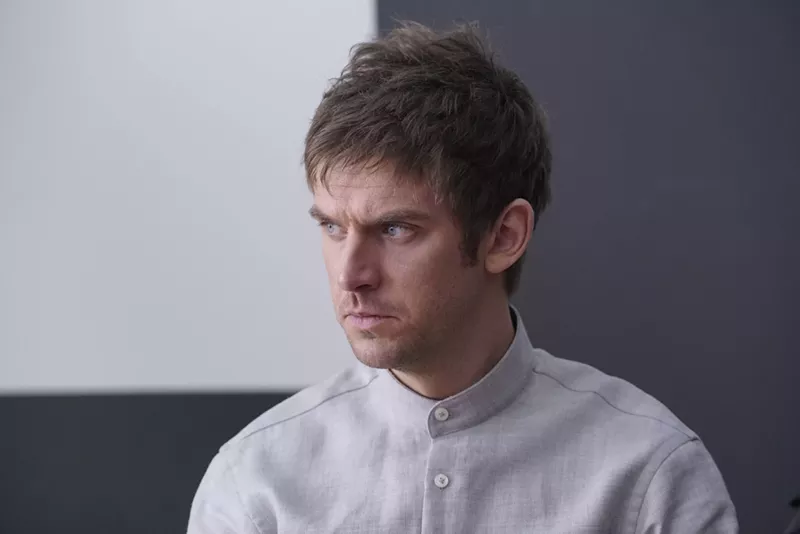Legion, the much-anticipated new FX series created by Fargo showrunner Noah Hawley, wastes no time plunging us into the murky depths of its lead’s unraveling mind, from blissful youth to harrowing adulthood plagued by a failed suicide attempt. Every scene is a dense visual and sonic cornucopia. Even quiet moments are packed with garish colors, clashing soundscapes, lush visuals and anachronistic fashion. In the first three episodes, Legion proves to be unlike anything else currently on television. That it is an adaptation based on Marvel Comics makes its audaciousness seem downright revolutionary.
When Bryan Singer’s first X-Men film premiered 17 years ago, it represented a remarkable shift for comic-book adaptations, which are now an inescapable staple of pop culture. These mutants, born with powers like shapeshifting and telepathy, were often called “the next step in human evolution.” But until now, the franchise itself hasn’t evolved. Its architects have chosen emotionally empty spectacles over exploring the political and wondrous nature the premise promises.
With Legion, Hawley seeks to dismantle every expectation of ossified franchises like X-Men and the superhero genre itself. The series follows David Haller (Dan Stevens), the mutant son of Charles Xavier, who is diagnosed with paranoid schizophrenia at a young age. David’s illness is inseparable from the tremendous psychic abilities he has little control over. Despite his parentage (Xavier was played by Patrick Stewart and James McAvoy in the films), Legion isn’t directly connected to the larger X-Men universe, instead carving its own world where mutants have yet to go public. Hawley isn’t strictly adapting any of the works related to this lesser-known character, who was created in 1985 by Chris Claremont and Bill Sienkiewicz. Instead, he’s using rich comic history to explore the ideas of identity, belonging and mental illness.
In the Clockworks Psychiatric Hospital, between visits from his prim sister Amy (Katie Aselton), David and his impish best friend Lenny (Aubrey Plaza) playfully joke about other patients and their treatment. His routine is interrupted by the arrival of Syd Barrett (Rachel Keller), who starts an odd romance with David despite her refusal to be touched. After some fantastical turns, David finds himself interrogated by government officials only to be saved by a ragtag group of mutants (including Syd) who need his help. That summary might sound simple, but it takes multiple viewings to fully parse out the plot. Everything is filtered through David’s unstable mind: Legion doesn’t show the world as it really is, but as David believes it to be.
For him, the past is always present. This lends the series a structure that moves between memories, flashbacks and hallucinations. Episodes shift wildly between saccharine romance, slow-motion action, overwrought drama and horror. Sounds blare. Colors are neon-bright and overwhelming. The writers refuse to nail down this twisting story in either time or place. The production and costume design are a delirious blend of 1960s mod, 1970s kitsch and modern touches — it could be tomorrow or 30 years in the past. Things only become more confounding as characters take physical journeys into David’s memories, thanks to the powers of Ptonomy Wallace (Jeremie Harris), a mutant who acts as a “memory artist” for Melanie Bird (Jean Smart), the demanding therapist and unconventional leader of the group. Legion proves itself to be less a story of a man dealing with great power than one about a man who is undone by it.
The series’ panache and tonal dexterity evoke awe. Still, at times, Legion can be too blunt in its references and styling, and the creators sometimes seem enamored with their own brilliance. Being so rooted in David’s mindset means that the other characters remain frustratingly opaque.
Plaza’s Lenny isn’t so much a person but an embodiment of David’s past as a drug addict, which he’d prefer to forget. Plaza leans into the highly stylized aesthetic to the point of grating artifice: Lenny’s so grotesque that it’s hard to figure out how these two can be friends, especially considering their history of enabling each other’s drug addiction. If Lenny is the metaphorical devil on David’s shoulder, Syd is her angelic opposite. She’s introduced in a warm halo of light immediately framing her as David’s love interest. She’s so alluring that it soon becomes apparent that we’re seeing not who she is but who David wants her to be — a vehicle for his salvation. (Her occasional insouciance proves she’s more complicated than David perceives her as.)
And Legion’s adherence to keeping the truth at arm’s length underscores the troubling handling of its most important issue: mental illness. Mental illness is having a moment on television, with nighttime soaps like How to Get Away with Murder and musical comedies like Crazy Ex-Girlfriend featuring main characters struggling with it. For all its inventiveness, Legion is remarkably rote in how it continues the offensive ways mental health is treated on television, showcasing little of the nuance and humanity the subject matter deserves.
The writers make the mistake of defining David entirely by his illness, splitting his life between an idyllic childhood lit by the golden glow of nostalgia and a harrowing ever-after shaped by his schizophrenia. Schizophrenics can lead full lives; limiting David’s character flattens the story’s emotional resonance. That Hawley can’t conceive this reveals a startling lack of imagination and empathy. The writers seem more interested in using David’s diagnosis as an excuse for temporal trickery and stunning visuals than creating a portrait of a fully realized human being. Thankfully, actor Dan Stevens makes the character more than a jumble of tics and neuroses. He suffuses his line readings and physicality with unexpected innocence, humor and charm, helping us understand why people would keep letting David into their lives despite the chaos that follows.
“Everybody in here keeps saying I’m sane. What if they’re wrong?” David asks Syd near the end of the third episode. It’s a good question, especially considering how other characters discuss mental illness as if David only has worth if he’s completely sane. Hawley isn’t stuck adhering to some pre-existing canon, so he has the opportunity to rework this character from its problematic ‘85 beginnings. Some moments arguably find inspiration in Simon Spurrier’s take on the character in the comic-book series X-Men: Legacy, a hint that the character’s diagnosis may change as the show continues. In the comics, David has dissociative identity disorder, with each personality manifesting different powers — yet another troubling reminder of pop culture’s insistence that the trade off for mental illness is great skill.
It’s easy to write these problems off. It’s just a television show, right? But mental illness, especially rarer diagnoses like schizophrenia, are so heavily stigmatized that it’s dangerous to depict them improperly and to treat them as mere narrative devices from which to wring drama. To say this show or any other has a responsibility to treat this subject matter with humanity and understanding wouldn’t necessarily cut down on the fun quotient. For Legion it would also open up new possibilities in order to further enrich David’s characterization. Who really is David Haller? It’s a question the creators need to consider if they want their show to be more than a beautiful, ornate puzzle.

Audio By Carbonatix
[
{
"name": "GPT - Billboard - Slot Inline - Content - Labeled - No Desktop",
"component": "23668565",
"insertPoint": "2",
"requiredCountToDisplay": "2"
},{
"name": "STN Player - Float - Mobile Only ",
"component": "23853568",
"insertPoint": "2",
"requiredCountToDisplay": "2"
},{
"name": "Editor Picks",
"component": "17242653",
"insertPoint": "4",
"requiredCountToDisplay": "1"
},{
"name": "Inline Links",
"component": "18838239",
"insertPoint": "8th",
"startingPoint": 8,
"requiredCountToDisplay": "7",
"maxInsertions": 25
},{
"name": "GPT - 2x Rectangles Desktop, Tower on Mobile - Labeled",
"component": "24956856",
"insertPoint": "8th",
"startingPoint": 8,
"requiredCountToDisplay": "7",
"maxInsertions": 25
},{
"name": "Inline Links",
"component": "18838239",
"insertPoint": "8th",
"startingPoint": 12,
"requiredCountToDisplay": "11",
"maxInsertions": 25
},{
"name": "GPT - Leaderboard to Tower - Slot Auto-select - Labeled",
"component": "17676724",
"insertPoint": "8th",
"startingPoint": 12,
"requiredCountToDisplay": "11",
"maxInsertions": 25
}
]







